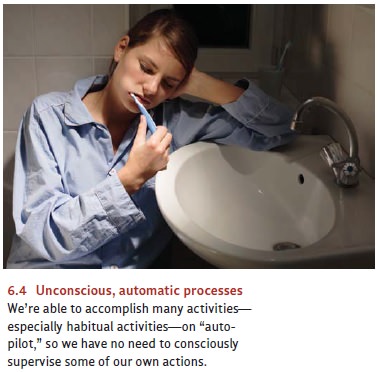Chapter: Psychology: Consciousness
The Function of Consciousness
The Function of
Consciousness
We’ve now seen several
indications of just how much can be accomplished without consciousness, and
we’ve also considered some cases in which people think they know what’s going
on in their own minds but are wrong. Can we, from this base, gain some insights
into when consciousness is needed,
and what difference it makes if a process unfolds under conscious supervision
rather than in the cognitive unconscious?
The answers to these questions
hinge on the fact that the cognitive unconscious involves processes that are
fast and effortless, but also automatic
(Figure 6.4). In other words, the cognitive unconscious is not under our direct
control. Instead, the cognitive unconscious is, in many settings, simply guided
by habit and so performs the same operations now that it has performed in the
past. In other settings, the cognitive unconscious is guided by cues in the
situation itself—stimuli that indicate what the current response should be.

This absence
of direct control
is often just
what we want,
because our habits generally serve us well and we usually
do want to respond in a fashion guided by cur-rent cues. Moreover, by relying
on the cognitive unconscious, we exploit processes that are, as we’ve said, fast
and effortless. But what if, in some circumstances, we want to resist past
habits or present temptations? What if our current goals require that
we launch some
action that’s novel?
In such cases, we need to
exercise executive control so
that we can inhibit our
habits, redirect our thoughts, and reset our priorities. And executive
control, it turns out, may require consciousness.
We note, though, that
consciousness doesn’t guarantee control. Sometimes we are aware of what we’re
doing and would prefer to do something else, but we still give in to the
temptation of the moment. (This is, for just one example, the familiar
situation of the dieter who’s aware that the second helping of pie is a bad
idea but takes it anyhow.) Even so, consciousness is essential for executive
control—a necessary first step toward directing our own mental lives.
Related Topics